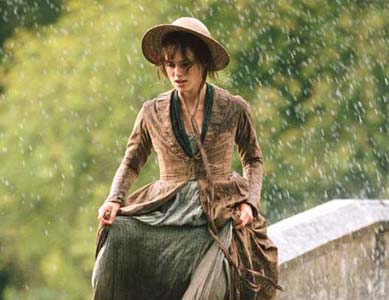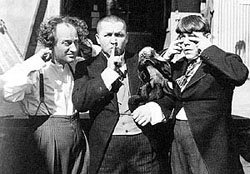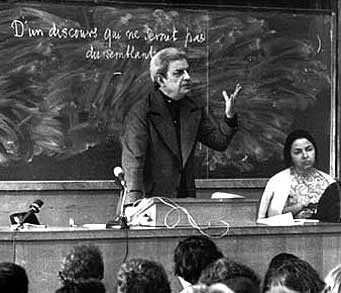
In an effort to describe my reaction to Pride and Prejudice (2005), I will submit to convention and use the word "feminine"--and by that I suppose I mean exasperation mingled with anticipation, and hopes--some foolish, some practical, some so sharp they seem almost necessary for sanity or survival--mitigated by the frustration of curtailed thought, passion, and opportunity. My generalized description here is a simple attempt to avoid stereotyping--but that is impossible, if one is to make it through any movie, no matter how "enlightened" or "iconoclastic" it might be. A First Principle of movies is that they invite the receptive viewer to wear a mask--no, something less active: to watch what it's like to be interestingly fictional, and in doing so to invent a self, and not just for the characters--or monoliths, or penguins, or whatever--but for the viewing self, "in" the movie just as the eye is "in" any objects it views--but more intimately in moving pictures.
 Such inventions of self--and self-inventions--are also by nature narrow, so as to fit any number of needs: those of the frame, of course, but also the need for a "dramatic arc" (even if it's just watching something like the Empire State Building, as Andy Warhol did, for eight hours, in Empire (1964); the act of filming it, even with a stationary camera, imposes a narrative). And the subtle but insistent needs of culture, gender, race, class, and so on shape the film and the response to it; but as narrow as the space may be, it is still inviting, as any life would be that is limited, yes, but also given a shape by the act of being filmed. As a result, as I watch P&P I can "become" the young girl, the thwarted lover, the pursued and irritated, the yielding or adamant woman--and yet not a woman, but a set of dramatic/cinematic causes and effects, drawing me into these invented lives so that I can take out the hanky and have a good cry, no matter how strange the changes are--of circumstance, culture, gender, class, and so on--that allow me to be someone else.
Such inventions of self--and self-inventions--are also by nature narrow, so as to fit any number of needs: those of the frame, of course, but also the need for a "dramatic arc" (even if it's just watching something like the Empire State Building, as Andy Warhol did, for eight hours, in Empire (1964); the act of filming it, even with a stationary camera, imposes a narrative). And the subtle but insistent needs of culture, gender, race, class, and so on shape the film and the response to it; but as narrow as the space may be, it is still inviting, as any life would be that is limited, yes, but also given a shape by the act of being filmed. As a result, as I watch P&P I can "become" the young girl, the thwarted lover, the pursued and irritated, the yielding or adamant woman--and yet not a woman, but a set of dramatic/cinematic causes and effects, drawing me into these invented lives so that I can take out the hanky and have a good cry, no matter how strange the changes are--of circumstance, culture, gender, class, and so on--that allow me to be someone else. But this cuts both ways: The movie also becomes me--and I don't mean it looks good on me--although that might be a clever-clever turn worth exploring--but looks better because I'm the movie, if I'm lucky. So I'm not crying just for Jane Austen's characters, but myself.* It's like those mind-transference gizmos in assorted shorts, animated or otherwise, in which Bugs Bunny or Curley changes place with a chicken or an ape. (And I'm sorry I even brought up these allusions; they threaten to distract me with a picking-through of such plots, how they're played as farce, but as I watch them I want to be able to do it myself; and so it becomes deeply important, that decision to get lost in someone else. I just watched the X-Files two-parter in which Mulder gets zapped and changes place with Mickael McKean's Area 51 Man in Black. Suffice it to say, even Curley learns something from jumping ship. Back we go.)
But this cuts both ways: The movie also becomes me--and I don't mean it looks good on me--although that might be a clever-clever turn worth exploring--but looks better because I'm the movie, if I'm lucky. So I'm not crying just for Jane Austen's characters, but myself.* It's like those mind-transference gizmos in assorted shorts, animated or otherwise, in which Bugs Bunny or Curley changes place with a chicken or an ape. (And I'm sorry I even brought up these allusions; they threaten to distract me with a picking-through of such plots, how they're played as farce, but as I watch them I want to be able to do it myself; and so it becomes deeply important, that decision to get lost in someone else. I just watched the X-Files two-parter in which Mulder gets zapped and changes place with Mickael McKean's Area 51 Man in Black. Suffice it to say, even Curley learns something from jumping ship. Back we go.) I will confess, if that cinematic someone else is a young Englishwoman a couple of centuries ago, I feel a bit selfconscious. But P&P knew what it was doing--and OK, I've read the novel, and so I was ready to let the film do it to me--but it was a pleasure to be done so thoroughly (all right, I'll stop now), and to fret over the restrictions of my gender and class. Then again, those restrictions do not necessarily seem so foreign. I will not presume to "know" anybody in the real world--at least for the sake of this argument--but literary/cinematic art invites me to give it a try--or provides a shorthand profile I can examine--no, a mask I can wear--no, no, more of a temporary pass, so that I can fret and fume, laugh and love, etc.--a vacation from me that also instructs me about me, at least in terms of what I'm willing to consider, where I'm willing to take my sympathies.
 Which seems pretty far. P&P reminded me of my perfect willingness to get all worked up over domestic storms and the plight of the unmarried young woman torn between her insistence that she should find the person she should love and her desire to be rid of all the bother of doing so. I usually don't watch these kinds of movies--and it's a shame I don't, because when I do, more often than not I get my money's worth. Just a few days after P&P I watched again Little Women, the 1949 one directed by Mervyn LeRoy and sustained by that great cast: June Allyson, Margaret O'Brien, Elizabeth Taylor, Janet Leigh, Mary Astor, Peter Lawford. It was on Turner Classic Movies, and I was just surfing along, but I let it linger, all the way.
Which seems pretty far. P&P reminded me of my perfect willingness to get all worked up over domestic storms and the plight of the unmarried young woman torn between her insistence that she should find the person she should love and her desire to be rid of all the bother of doing so. I usually don't watch these kinds of movies--and it's a shame I don't, because when I do, more often than not I get my money's worth. Just a few days after P&P I watched again Little Women, the 1949 one directed by Mervyn LeRoy and sustained by that great cast: June Allyson, Margaret O'Brien, Elizabeth Taylor, Janet Leigh, Mary Astor, Peter Lawford. It was on Turner Classic Movies, and I was just surfing along, but I let it linger, all the way.  I had done the same less than a year ago--and then it was in a way an even odder experience, since I was home alone, and could not "excuse" my watching it by hiding behind the sexism of having my wife and teenage girls' present as the "primary audience." Which is silly; after all these years of watching any old thing, it's a bit late to have to draw myself up to my full height (and those who know me appreciate the joke) and get all manly and fist-clenching about it. Feh; I grew up with an older sister, so it was Shirley Temple Theater right before Dagwood and after The Bowery Boys on rainy Sundays. Lucky enough to have grown up in a watch-without-discernment household, I can work up a good cry with the best of them. Again, watching P&P so close after LW, I recalled watching the latter on my own last winter, and bawlin' my little eyes out over the March girls' tribulations.
I had done the same less than a year ago--and then it was in a way an even odder experience, since I was home alone, and could not "excuse" my watching it by hiding behind the sexism of having my wife and teenage girls' present as the "primary audience." Which is silly; after all these years of watching any old thing, it's a bit late to have to draw myself up to my full height (and those who know me appreciate the joke) and get all manly and fist-clenching about it. Feh; I grew up with an older sister, so it was Shirley Temple Theater right before Dagwood and after The Bowery Boys on rainy Sundays. Lucky enough to have grown up in a watch-without-discernment household, I can work up a good cry with the best of them. Again, watching P&P so close after LW, I recalled watching the latter on my own last winter, and bawlin' my little eyes out over the March girls' tribulations. It was a "good cry," too, again as much over myself as them--and as much for real people in all kinds of trouble as for the movie's clever constructs. And more than clever, because my feelings are real, even if the catalyst isn't. Now, my betters have covered this pretty thoroughly--Aristotle's mimesis, Coleridge's "suspension of disbelief," the Lacanian infant's jubilation at seeing himself in the mirror, Herman Noodicks and his theory of--sorry. And someday I simply must read their books. But for now I'm happy to report I can keep up with Margaret O'Brien's lachrymal marathons, if only because my own jubilation before the "special mirror" of the movies allows for every association, tearful and joyful, wolfish and seraphic. So get out your handkerchiefs, or laugh like an idiot, or scream in terror--just, at least this once, don't cover your eyes. It defeats the whole purpose.
It was a "good cry," too, again as much over myself as them--and as much for real people in all kinds of trouble as for the movie's clever constructs. And more than clever, because my feelings are real, even if the catalyst isn't. Now, my betters have covered this pretty thoroughly--Aristotle's mimesis, Coleridge's "suspension of disbelief," the Lacanian infant's jubilation at seeing himself in the mirror, Herman Noodicks and his theory of--sorry. And someday I simply must read their books. But for now I'm happy to report I can keep up with Margaret O'Brien's lachrymal marathons, if only because my own jubilation before the "special mirror" of the movies allows for every association, tearful and joyful, wolfish and seraphic. So get out your handkerchiefs, or laugh like an idiot, or scream in terror--just, at least this once, don't cover your eyes. It defeats the whole purpose.*Of course, I cannot let this comment go by without mentioning G.M. Hopkins' poem, "Spring and Fall," in which he asks the child, "Margaret, are you gríeving / Over Goldengrove unleaving?" and ends with what we knew all along: "It is Margaret you mourn for." I will be getting to another Margaret in a few paragraphs. It is a happy coincidence.
No comments:
Post a Comment